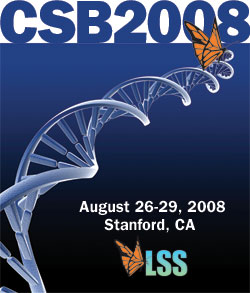The effect of massive gene loss following whole genome duplication on the algorithmic reconstruction of the ancestral Populus diploid
Chunfang Zheng, P. Kerr Wall, Jim Leebens-Mack, Victor A. Albert, Claude dePamphilis, David Sankoff*
Department of Mathematics and Statistics, University of Ottawa, Ottawa, Ontario K1N 6N5, Canada. sankoff@uottawa.ca
Proc LSS Comput Syst Bioinform Conf. August, 2008. Vol. 7, p. 261-270. Full-Text PDF
*To whom correspondence should be addressed.

We improve on guided genome halving algorithms so that several thousand gene sets, each containing two paralogs in the descendant T of the doubling event and their single ortholog from an undoubled reference genome R, can be analyzed to reconstruct the ancestor A of T at the time of doubling. At the same time, large numbers of defective gene sets, either missing one paralog from T or missing their ortholog in R, may be incorporated into the analysis in a consistent way. We apply this genomic rearrangement distance-based approach to the recently sequenced poplar (Populus trichocarpa) and grapevine (Vitis vinifera) genomes, as T and R respectively.
[ CSB2008 Conference Home Page ] .... [ CSB2008 Online Proceedings ] .... [ Life Sciences Society Home Page ]